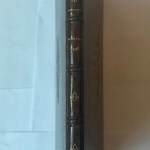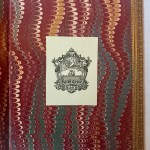BORGOGNI, Gherardo. La fonte del diporto. Dialogo del signor Gherardo Borgogni, l’Errante Accademico Inquieto di Milano.
Bergamo, Comino Ventura, 1598.
£ 4,000
FIRST EDITION. 4to, ff. (iv) 62, (no signature)4 A-O4 P6. Roman and Italic letter. First part of the title within cartouche at the top of the page, an architectural frieze. Large printer’s device of Fortune goddess within elaborate border and motto “Bona fortuna”; head- and tailpieces, decorated initials. Bookplate of Baron Horace de Landau (1824-1903) with library number on front pastedown. 20th-century ex libris of V.d.G. (Ludovico de Gobbis) on verso of first front flyleaf and rear pastedown (his motto: Je fus sage je fus fou), woodcut bookplate by the Venetian artist Alberto Zanverdiani. In a modern panelled large-grain brown morocco binding, gilt with green inlay by Loric (rose branches entwined along the arms of an emerald green compass), angular fleurons (fleur-de-lis), fine inner dentelles, marbles pastedowns and fore-edges, a.e.g.. A fine, clean, and fresh copy.
First edition of this fine dialogue written by Gherardo Borgogni (1526 – ca. 1608), which was dedicated to his patron the Count Pirro I Visconti Borromeo as the prefatory letter makes clear. Born in Monferrato, Borgogni was an assiduous traveller during his early life through living in Spain as well as in southern Italy and eventually settling down in Milan. There, he became a member of the Accademia degli Inquieti (Academy of the Restless), in which he entered with the name of “Errante”, the Errand. ‘Fonte del Diporto’ (1598) – which title could be translated as ‘the source of pleasure’, or ‘recreational time’ – is a collection of poems he composed and delivered to his fellow academicians during their meetings. Between the poems, short digressions in prose create unity of meaning. Important figures of the time such as the founder of the academy Muzio Sforza Colonna, the Marquis of Caravaggio, Count Ferdinando Nogarola and the Spanish governor of Milan, Juan Fernandez de Velasco featured as characters of the dialogue, hence showing Borgogni’s acquaintance to an important aristocratic circle. Borgogni established his reputation also through his activity as editor of several poetic works. The present work includes sonnets to the author by Cosmo de Aldana, Gentleman-Usher to Philip II of Spain, and the academy members Francesco Piccinelli, Ercole Cimilotti and Muzio Manfredi.
Rare: not in Adams or the British Library, NUC records only 2 copies. Brunet states: “Edition belle et rare. Quoique moins complète d’ailleurs que celle de 1602, elle renferme quelques morceaux qui n’ont pas été réimpr. dans cette dernière”. EDIT16 7149; USTC 816509.






